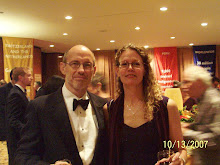Wall Street's 'Flash Crash'
The cause of the crash is still a mystery but regulators do suspect an obscure corner of the stock market referred to as ‘off exchange trading’. The New York Stock Exchange is no longer the main venue for trading stocks in the U.S. Now, according to Ben Steverman in Bloomberg BusinessWeek, “equity markets have become fragmented among different exchanges and trading platforms” in which a few firms use powerful computers to execute tens of thousands of trades a second. This “high-frequency trading” is what some regulators believe may be the trigger of financial trading insecurity.
Even if high frequency traders didn’t spark the drop their turbo charged technology certainly accelerated it. When the free fall began NYSE “circuit breakers” kicked in to slow trading by putting a floor under falling stock prices. But just as quickly, some traders moved their dealing to alternative trading platforms, where similar safeguards don’t exist. This small number of ‘independent’ high-frequency traders flooded the market with sell orders. At least one valuable stock (Accenture) fell to a penny a share. Michael Hiltzik in the Los Angels Times believes “by any rational standard of market performance, that’s a sin,” and the Securities and Exchange Commission is largely responsible by allowing such trading to grow so large that it threatens the entire financial system. But even the SEC has neither the technology or the expertise to control or moderate it.
The problem, said James Angel in Forbes.com, is that “markets now react in milliseconds to events, but are monitored by humans who respond in minutes.” The trading industry could speed up fail safes and implement automated circuit breakers that operate simultaneously across every trading venue. This would give humans a chance to step in and prevent the inevitable trading glitch from cascading into disastrous market meltdowns.
Summary: By reducing the freedom of independent traders to do “off exchange trading” and also implementing enforceable global controls we may be able to reduce the economic insecurity of trading. Such ‘accidents’ as the flash crash can pave the way for great innovation. But ultimately, given the difficulty in following and monitoring money exchanges (see 4 basic treaty groups)…even this won’t ensure economic stability for all. That will require a transformed global economic system covering nearly all aspects of trade and finance plus fair and enforceable means of their global regulation.
Is this was traders want? Is this what ‘we the people’ want? Stock trading may be one element of security where most of us simply don’t care. But I’m guessing in the larger scheme of things the DOW does has some important role to play in our national and global affairs of economic security. I just haven’t learned it yet.


0 Comments:
Post a Comment
<< Home